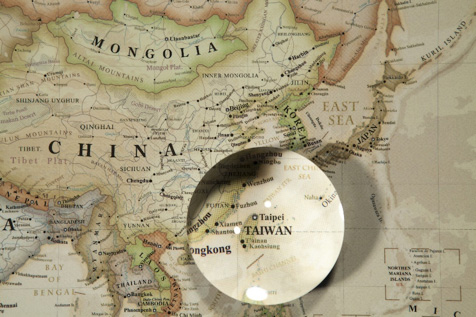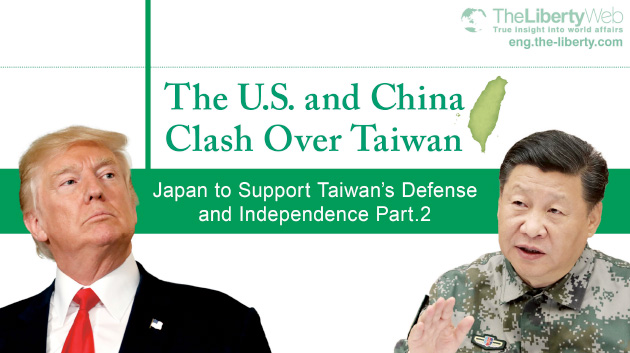The U.S. and China Clash Over Taiwan
Japan to Support Taiwan's Defense and Independence Part.2
Japan Should Acknowledge Taiwan as an Independent State
The U.S. had made clear their stance of protecting Taiwan. What should Japan adopt as their Taiwan policy?
Every time the U.S. and Taiwan strengthened their ties, China lashed out declaring that Taiwan is part of Chinese territory. If we look back over history, however, neither the U.S. nor Japan have ever acknowledged China’s assertion.
In 1979 when the U.S. cut ties with Taiwan to formally establish diplomatic relations with China, China’s Deng Xiaoping administration promised the U.S.’s Jimmy Carter administration that China would use peaceful means – not military power – to “reunite” Taiwan and China.
The U.S. then legislated the Taiwan Relations Act to make it possible to continue their alliance with Taiwan after their break. The Act was a de facto military alliance that assured American support for Taiwan’s defense including the provision of equipment.
Additionally, in March this year, the Trump administration passed the Taiwan Travel Act that encourages government officials of both countries to meet. In August, the National Defense Authorization Act (NDAA) added sections allowing joint military training and cooperation between military officials of both countries.
The Trump administration is treating Taiwan as a country.
Meanwhile, Japan cut ties with Taiwan to form ties with China in 1972. Nowhere in the Japan-China Joint Communiqué signed at the time, is there a statement recognizing the “one China” principle. Regardless, Japan has not been treating Taiwan like a country out of strategic consideration for China.
Since Japan doesn’t have a Taiwan Relations Act or a Taiwan Travel Act like that of the U.S., their only relations with Taiwan have remained on an unofficial level.
Master Ryuho Okawa, founder and CEO of Happy Science, says in his book “The Japanese Justice that will Guide the World”
I am aware that some people still think of the state of Taiwan as being part of China. But as long as Taiwan maintains their position as a country of freedom and democracy, it will stop China’s expansionism from crossing the final line.
What Japan Should Do
First, Japan should declare that they do not acknowledge China’s “One China” claim that Taiwan is part of China.
Then, Japan should legislate their version of a Taiwan Relations Act and a Taiwan Travel Act so that leaders from both countries can gather during Taiwan’s emergencies.
Also, in order to help Taiwan break free from their economic reliance on China, they should form a Japan-Taiwan Trade Act to deepen economic connections.
China is using diplomatic pressure to isolate Taiwan from the international community. Japan should support Taiwan’s return to the global stage and the UN. Ultimately, Japan should recognize Taiwan as an independent nation, and formally establish diplomatic ties.

Japan’s Taiwan Policy
Before:
- Doesn’t acknowledge Taiwan as an independent country out of strategic consideration for China
- No laws comparable to the Taiwan Relations Act or the Taiwan Travel Act
- Ignores Taiwan’s isolated status in the international community
After:
- Not to acknowledge China’s claim that Taiwan is part of China
- To Legislate Japan’s own Taiwan Relations Act and a Taiwan Travel Act
- To start economic support for Taiwan including trade agreements
- To support Taiwan’s becoming a member of the international community and the UN
- To acknowledge Taiwan as an independent nation and establish formal diplomatic ties
- To sign a military alliance and form a Taiwan defense system together with the U.S.
To Defend Taiwan Is to Defend Japan
In June, Taiwanese minister of Foreign Affairs Joseph Wu requested a talk with Japan regarding security, saying, “Both Japan and Taiwan are facing China’s threatening military pressures.”
“If Chinese military forces move south through the Miyako Strait it would be a threat for Taiwan,” Wu pointed out. “And if they move north through the Bashi Channel it would be a threat for Japan.” Taiwan and Japan’s security is inseparable from each other.
Japan has no formal ties with Taiwan, and it is unprecedented that a high official from Taiwan should request such a meeting. It explains that China’s pressures on Taiwan have reached a critical state.
China’s Next Target Is Senkaku and Okinawa
If China decides to swallow Taiwan, they would simultaneously target the Senkaku and Okinawa islands. Japan must realize that “defense for Taiwan = defense for Okinawa”. The following is a potential Taiwan defense policy for Japan.
In order to block China’s advances, there is a need to place surface-to-surface and anti-ship missiles not just on Okinawa but also on Taiwan. If Japan and the U.S. plan to conduct joint military exercises around Okinawa, they should also push to have Taiwan join them.
In the past, U.S. National Security Advisor John R. Bolton proposed to move U.S. troops stationed in Okinawa over to Taiwan. At the very least Japan should arrange so that their maritime fleets can call at ports in Taiwan.
If we think of a scenario where China launches multiple missiles simultaneously into Taiwan, we would need defense systems that use microwaves to shoot them down.
After strict anti-espionage procedures, these state-of-the-art weapons and submarines should be exported into Taiwan.
For Japan to do anything during a Taiwan emergency, however, they will need to establish a Relations Act that will allow them to intervene. The Trump administration is being very generous with their Taiwan policy, and Japan must seize this opportunity to prepare its own Taiwan defense system.
Column
We Want to Protect Taiwan’s Freedom, Democracy and Faith
Ryoko Shaku
Party Leader of the Happiness Realization Party

Born in 1969 in Tokyo, Shaku graduated from the Kokugakuin University, majoring in history. After working at a major Japanese corporation, she became a Happy Science cleric where she served in The Liberty Magazine department and later managing director. From July, 2013 she has been the party leader of the Happiness Realization Party (HRP)
China is increasing their pressures on Taiwan in the hope of annexation, and the Taiwan situation has become very grave. Japan is likewise a target of China’s military threat, and there is a need for Japan to extend a hand in support of Taiwan’s defense and independence.
The HRP has constantly been arguing that Japan should acknowledge Taiwan as a country, establish formal diplomatic relations and support their joining (or return to) the UN. There is a need to deepen our friendship not just on a private level but also between our governments, through cooperation in the economy and security.
I have great respect for former President Lee Teng-hui, the father of Taiwanese democratization. Mr. Lee gave us, the HRP, a very inspiring message in September 2017. It went thus:
When I made political reforms for the democratization of Taiwan, each time I had to face difficulties my single source of consolation was faith: the presence of God. Faith is motivating force that powers the convictions of a leader.
The spiritual connection between your people and myself comes from our strong convictions and our faith in God.
Taiwan is a country of freedom, democracy and faith, but these values are about to be taken away by the Communist Party of China. As a political party in Japan, we cannot sit idly by and watch that happen.
Japan must move synch with the U.S. and establish a diplomatic and security policy based on the China encirclement network. Now is the time for countries that cherish freedom, democracy and faith to join and work together.



















